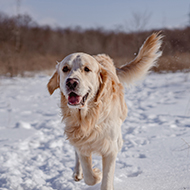Canine diabetes more common in colder areas, study finds

Dogs were diagnosed significantly more in winter, and in northern USA.
A new study has found that diabetes mellitus diagnoses in dogs are more common in northern latitudes and during winter.
Research has suggested that in humans, Type 1 diabetes mellitus is more common in northern latitudes, and scientists have now identified a similar pattern in dogs.
Recruiting dogs from around the United States, researchers looked at 960 pet dogs to explore the relationships between geography, seasonality and diabetes. The owners filled out surveys, including information such as their dog's age, date and age at the time of diagnosis and state of residence.
Of the dogs recruited, 669 had a known date of diabetes diagnosis, and of these 33 per cent were diagnosed in the winter, in comparison with 24 per cent in the spring, 24 per cent in the summer and 19 per cent in the autumn.
Geographically, 45 per cent of diagnoses occurred in dogs in the North, 15 per cent in central US, 27 per cent in the South and 12 per cent in the West.
Researchers found these results surprising, given that 31 million dogs live in the South, compared to around 24 million in the North.
Professor Rebecka Hess, senior author on the study, said: "To be honest, I was surprised we found this connection, even though it had been hinted at before. I was always skeptical of the data.
“But when I saw our results, it was quite clear. The findings were strengthened by the fact that diabetes diagnoses were more prevalent in both the winter and the North.
“Results would have been more difficult to interpret if, for example, we had found increased prevalence in the winter but also in the South."
In the study, Professor Hess and co-authors explained: “Although the association between type 1 DM, winter, and cold climate regions is not fully understood in humans, and has yet to be studied in dogs, the shared DM risk associated with winter and cold climate in humans and dogs suggests that similar environmental factors could be influencing disease expression in both species.”
The study, 'Seasonality and geography of diabetes mellitus in United States of America dogs' has been published in PLOS ONE.



 The RCVS has announced a new version of its 1CPD mobile app, with enhanced features for veterinary surgeons and veterinary nurses to record their continuing professional development.
The RCVS has announced a new version of its 1CPD mobile app, with enhanced features for veterinary surgeons and veterinary nurses to record their continuing professional development.